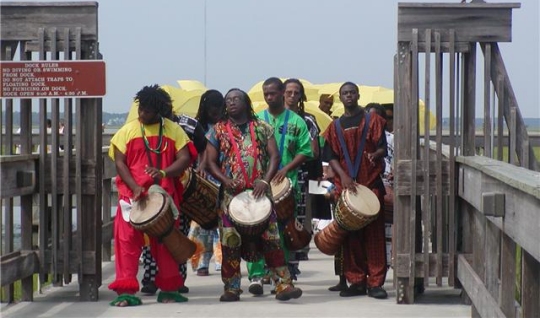February is a month long celebration of the Hilton Head Island Gullah Culture. In addition to the island, Charleston and the entire Lowcountry were the centers of the Gullah community and heritage. While the topics and activities for the festival are numerous, I am especially fascinated with the Gullah connection to music.
Churches were an important source of songs, praise, and hymns for the native islanders and where a variety of music was initiated. People sang about hope, freedom of spirit and body, and sometimes despair. These songs often had double meanings that prevented outsiders from recognizing their full implications. Drums and congas were the only instruments available and used to accompany the singing. As my friend, Lavon Stevens put it so well, “You started with your voice and your hands”. The drums encouraged them to sing and move and the songs evolved.
The oldest native congregation on the island, First African Baptist Church, recorded and documented the great and well known camp song, Kumbahyah, and is likely where it was first sung. Last year, the Hilton Head Symphony Orchestra commissioned an original score of the spiritual written for the orchestra and played it to an appreciative audience during the 2013 celebration. There is little doubt that it will be performed again and again to symbolically acknowledge all the gifts that the Gullah Culture has contributed.
Another type of music, “Field Holler Songs”, were often sung to express the true emotion of the slaves. As the name suggests, these songs were sung outdoors while the islanders were working. Sometimes, they sang of despair, sometimes hope, but often they conveyed the lack of opportunity to improve the conditions as they existed in their world. They learned to use their field singing as a means of communication as well. Down by the River might be the location of a secret meeting while other songs subtly conveyed a variety of other messages.
While New Orleans claims the origin of Jazz, research shows that our area also contributed greatly to jazz as we know it today. Many African American jazz musicians went to Europe or stayed there after World War I because they found more musical opportunities in Paris than at home. These artists helped to blend the many cultures that define our modern day jazz as it returned to America.
Charleston, SC was highly involved in the jazz movement here in the states. Nearly 40 percent of slaves in the U.S. were brought into the country through Charleston, many of which remained. After the Civil War, recently freed slaves often played and sang on the streets of the city. Dizzy Gillespie is one of the best known musicians and bandleaders of all the originators of jazz and was born in Cheraw, SC. He worked with the greats, Ella Fitzgerald and Charlie Parker to mention a few. Other famous artists included Charleston’s Ann Caldwell, Speedy Jones, and Freddy Jenkins.
If this has whet your appetite to learn more, make plans to come to Hilton Head during the month of February. Take the Gullah Heritage Trail Tour and taste the exceptional food or learn more about art and crafts while you are here. If you are lucky, you may hear a tale or two that has been passed down from generation to generation in some of the families – most of which have never been written. Here is the link to music events: http://www.gullahcelebration.com/events-calendar/#music Hope to see you soon…


